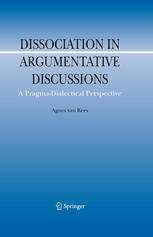

Most ebook files are in PDF format, so you can easily read them using various software such as Foxit Reader or directly on the Google Chrome browser.
Some ebook files are released by publishers in other formats such as .awz, .mobi, .epub, .fb2, etc. You may need to install specific software to read these formats on mobile/PC, such as Calibre.
Please read the tutorial at this link: https://ebookbell.com/faq
We offer FREE conversion to the popular formats you request; however, this may take some time. Therefore, right after payment, please email us, and we will try to provide the service as quickly as possible.
For some exceptional file formats or broken links (if any), please refrain from opening any disputes. Instead, email us first, and we will try to assist within a maximum of 6 hours.
EbookBell Team

4.0
26 reviewsDissociation is a pervasive argumentative technique that can be found in argumentative discussions from all realms of public and private life. Up till now, a comprehensive and systematic argumentation theoretical study of dissociation does not exist. This book aims to fill this gap.
The treatment in this book, in several respects, is innovative. To begin with, so far, dissociation has been studied mainly from a monologual orientation. This book specifically focuses on dialogual aspects of the use of dissociation in argumentative discussions. In the second place, extant studies deal primarily with examples of dissociation from the philosophical and literary spheres or from the political arena. This book discusses a great variety of examples, many from every-day contexts, from such sources as newspapers, television shows, websites, Parliamentary Reports, and ordinary conversations. Last, but not least, the present book examines a broad range of features of dissociation. The first part of the book clarifies the notion of dissociation and provides insight into the way in which dissociation becomes manifest in argumentative discourse. The second part of the book, using the theoretical perspective of Pragma-Dialectics, answers the question how dissociation is used by the participants in argumentative discussions to realize their dialectical and rhetorical aims. The third and last part of the book discusses the strengths and weaknesses of the use of dissociation in argumentative discussions, both with regard to its dialectical soundness and to its persuasive effectiveness.